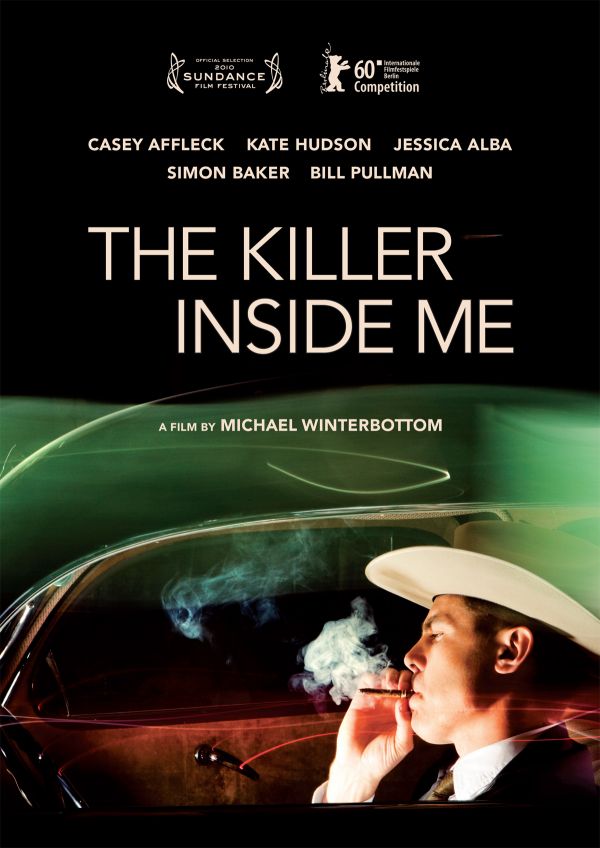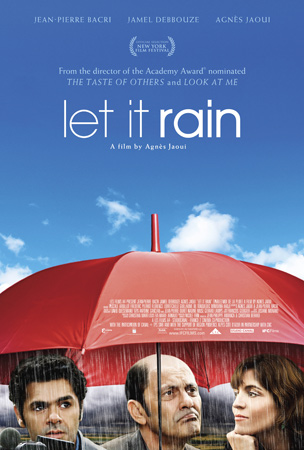 THE KILLER INSIDE ME (2010, directed by Michael Winterbottom, 109 minutes, U.S.)
THE KILLER INSIDE ME (2010, directed by Michael Winterbottom, 109 minutes, U.S.)
CYRUS (2010, directed by Jay & Mark Duplass, 92 minutes, U.S.)
LET IT RAIN (2008, directed by Agnès Jaoui, 98 minutes, France)
BY DAN BUSKIRK FILM CRITIC
Filming a novel like Jim Thompson’s pulp classic The Killer Inside Me is probably a fool’s errand, its lurid portrayal of a crazy Texas sheriff ain’t the shocker it once was, but that hasn’t stopped British director Michael Winterbottom from diving in and creating a surprisingly inert adaptation.
Published in 1952, The Killer Inside Me is an inelible portrait of a sadistic killer, its narrative driven by the interior dialog of Luke Ford, a Texas sheriff who commits a handful of murders while hiding behind a facade of dim affability. Fifty-eight years have lessened the novelty of seeing the world through a killer’s eyes (heck, a show like Showtime’s Dexter even makes the serial killer a hero) and the film noir genre has been revived and re-revived so many times over the years that the genre is now beyond parody. There was a forgettable attempt to update the material with Stacy Keach in 1976, and since then there have been a number of false starts with everyone from Tom Cruise, Brad Pitt and Quentin Tarantino attached to the project, all of them failing to get the project off the ground. It was hard to imagine what take Winterbottom could have on this material that could breath new life into this tortured tale.
Winterbottom brings an outsider’s fetishy love for early ‘50s Americana — every little doorknob and knick-knack is just so and cinematographer Marcel Zyskind captures the beautiful flat and barren landscape of Oklahoma (standing in for Texas). Yet the script by Jim Curran, despite using narration taken directly from the book, never gets inside the dual nature of its protagonist. Neither does Casey Affleck’s timid performance, his unsteady voice never claiming the authority of Luke’s position while his sudden outbursts of violence lack the sort of sadistic pleasure that Ford shows in the novel.
The film’s violence, particularly towards the women in the film (Jessica Alba as the prostitute Joyce and Kate Hudson as Luke’s girl Amy) are the scenes in which Winterbottom seems most alive, they’re disturbingly protracted, torturous beatings that are as effective for their sound design as for what we see. Their eroticism might be excusable if the direction had taken Luke’s perspective but the film doesn’t see things through Luke’s eyes until its final scenes, where his delusions and reality merge. I enjoyed some of the witty music cues, particularly rockabilly madman Charlie Feather’s “One Hand Loose” and a tune by Spade Cooley (the Western Swing star famous for killing his wife) but the most disturbing thing about Winterbottom’s misfire is how unmoved such madness leaves its audience.
– – – – – – – – – – – – – – –
Jonah Hill, a big-boned comic actor from the Apatow posse, makes for a much more interesting crazy in the Duplass Brothers new comedy Cyrus. He’s  the title character, a mama’s boy of outsize dimensions who stands between the true love meant for his mother Molly (Marisa Tomei) and her new beau, John (the ever-likable shlub John C. Reilly).
the title character, a mama’s boy of outsize dimensions who stands between the true love meant for his mother Molly (Marisa Tomei) and her new beau, John (the ever-likable shlub John C. Reilly).
It’s all told from John’s point of view, a divorcé, still a little too needy towards his ex-wife played by Catherine Keener. John and Molly meet cute at a party but their romance is foiled by Molly’s way-too close relationship with the 21- year-old Cyrus, who was home-schooled and is still home, doing everything short of sucking at the hind teat of his over-protective mom. John’s a bit of a man-child himself so it is no surprise that before long he and Cyrus have locked horns in a passive-aggressive battle for Molly’s attentions.
Directors Jay & Mark Duplass were my least favorite participants of the Mumblecore scare of the last few years, particularly for their self-satisfied acting performances in their self-directed films. Firing themselves as actors is the best idea they’ve had yet; if you’re going to get by on slight, under-written plots it really helps to have high-quality actors to make something out of near-nothing. Tomei seems to have found a second wind in her career, add this to The Wrestler as another role where she appears radiant while providing a mothering warmth to a sweet sad sack. John C. Reilly again shows his flair with parts that call for him to be a big lump of mush but most intriguing is Jonah Hill, who can always milk a laugh but here shows a slightly unhinged side we’ve never seen before. We see it when he performs his electronic music for John in his home studio in an endearingly preposterous scene and later as he lies and lies again about the secret war he is waging to keep John and his mom apart. The comedy may be told from John’s point of view but it is Hill’s giant doughboy whose gravitational pull makes the story revolve around himself. Cyrus may be a bit slight but seeing Hill stretch his talent is an event worth witnessing.
– – – – – – – – – – – –
 Watching Cyrus, it reminded me of the sort of small scale comedies the French make, something Gérard Depardieu might have starred in twenty-odd years ago. The latest film from actress/director Agnès Jaoui also contains just the whiff of a plot yet it is much more sophisticated in it grasp of politics, culture and people.
Watching Cyrus, it reminded me of the sort of small scale comedies the French make, something Gérard Depardieu might have starred in twenty-odd years ago. The latest film from actress/director Agnès Jaoui also contains just the whiff of a plot yet it is much more sophisticated in it grasp of politics, culture and people.
Let It Rain (whose French title, Parlez-Moi De La Pluie, translates more directly into “Tell Me About the Rain”) chronicles a few short days in the life of a group of loosely connected French citizens. Jean-Pierre Bacri is the semi-competent documentary filmmaker Michel, who recruits a promising ex-film student of his, Karim (Jamel DeBouze of Luc Besson’s Angel A), to direct a film about feminism, featuring Agathe (director Jaoui), a childless writer who is beginning a career in politics. Karim’s mother has worked for Agathe’s family as an housekeeper since he was a child and while interviewing Agathe (the filming of which gets tripped up by a series of comic gaffes) Karim’s underlying hostility is revealed.
Like Cyrus, there is not a lot of action in Let It Rain; affairs threaten to break out, then don’t, a big rally is planned and never happens. But what does happen is lots of conversation, delivered with a compelling naturalness by the uniformly excellent cast, conversation that is full of ideas and insights about men and women and our place in society. Some complain that nothing really happens in the film and they’re right. However everything is considered, which is why Jaoui’s films seem so rich in comparison to so much of our domestic fare.
